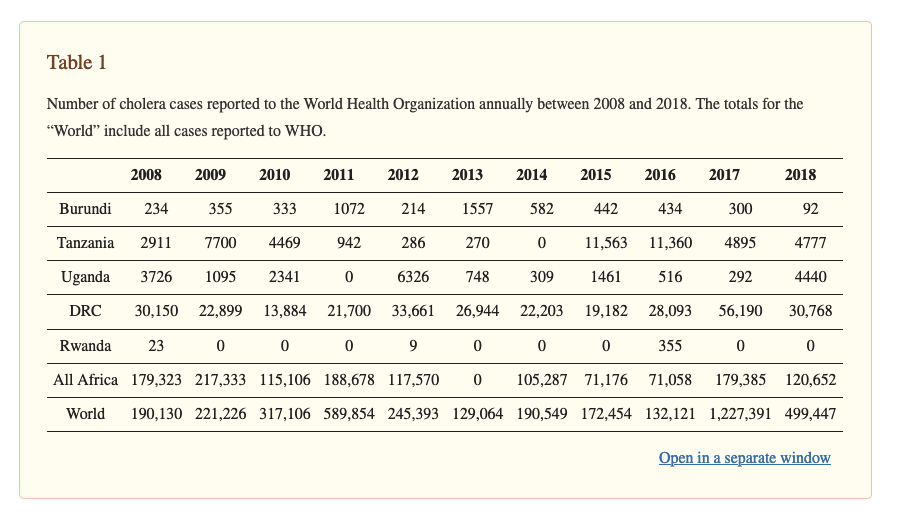Burundi declares a cholera outbreak, here are the details
RegionWeek Newsletter Vol VII, Issue #222 | Tuesday, January 3, 2023
Dear RegionWeek Reader
Burundi has declared an outbreak of cholera. Five cholera patients are still hospitalized, while seven others have already been discharged, the Health Ministry said Sunday evening in a communiqué.
Various tests were done and the results of the National Institute of Public Health issued on December 31, 2022, confirmed that it was cholera, reads the statement.
Among the decisions taken after the announcement is the ban on selling cooked and raw food products on the streets in Bujumbura.
The current situation "Nine suspected cholera cases were identified on Dec. 30, 2022, in the northern health district in the commercial capital Bujumbura with symptoms of diarrhea and vomiting, mainly in Bukirasazi neighborhood in Kinama zone. The next day, two other suspected cases were identified in Mutakura neighborhood, close to Bukirasazi," said Minister Sylvie Nzeyimana in a statement.
Why it matters: Endemic to the strip of land running alongside Lake Tanganyika and the Rusizi River, cholera affects an average of 200 to 250 people per year. Some of the factors in Burundi that relate to cholera patterns include seasonality, population density, insufficient water-sanitation infrastructure, considerable internal and external migration, poverty, and the relationship of people to Lake Tanganyika.
Extremely contagious, cholera is caused by ingesting bacteria of faecal origin – Vibrio cholerae – which are present in dirty or stagnant water. Causing diarrhoea and vomiting, cholera leads to rapid dehydration and, without prompt care, can kill within hours.
Cholera transmission is closely linked to inadequate access to clean water and sanitation facilities. Typical at-risk areas include peri-urban slums, and camps for internally displaced persons or refugees, where minimum requirements of clean water and sanitation are not been met.
The last wave of cholera outbreak spread across the region in 2019 and 2020, with nearly 1,300 reported cases. After 18 months of dormancy, just nine cases were reported at the end of 2021. But there are bound to remain places where the bacterium can spread. For 2023, the risk of a new outbreak is real.
According to Unicef, In Burundi, the cholera menace tends to move cyclically, surging and vanishing among the many cases of diarrhoea. The country’s western flanks, which hug the shores of Lake Tanganyika, are particularly endemic.
Thanks for reading,
Fabrice Iranzi, Editor in Chief, RegionWeek
More from our Website
Burundi: Jean Luc Kesch co-founder of Menya Media dies in a car Accident. Jean-Luc Kesch the Belgium national who lived in Burundi since 1982 passed away in a road accident. He was hit by a bus in Bujumbura while he was jogging in the morning.
2023: Key takeaways from President Ndayishimiye end of the year address. In a video shot at the porch of Gitega Presidential Palace and aired this Saturday night, President Evariste Ndayishimiye gave an address focused on reinventing the leadership and the power of unity in the pursuits of the goals that will make Burundi a developed country in 2060.
Paul Kagame:” We have had enough of this hypocrisy, it is high time that the unwarranted verification of Rwanda stopped”. Speaking in his year-end message on Saturday, December 31, 2022, in Kigali, Rwanda.
Faustin Ndikumana: Three Factors Have Influenced Inflation in Burundi. The central bank published that inflation is at 26.8% in Burundi, which creates tension in social life. This economist said that if inflation reaches 10%, it is already a warning.





